Scalp Treatment
Suffering from Hair and Scalp Problems?
Did you know that our scalp ages 12x faster than our skin? This ageing leads to irreversible hair
and scalp problems and low confidence. We can help you treat these problems before it’s too late:
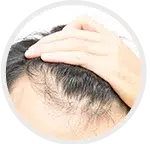
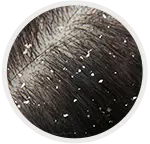
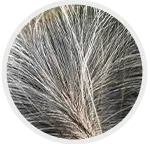
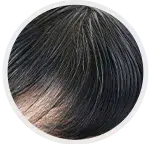
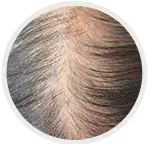
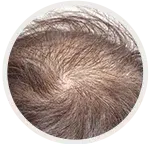
Types of Scalp Problems
Oily Scalp
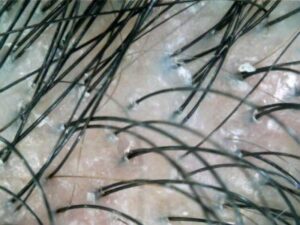
An oily scalp refers to a condition where the scalp produces an excessive amount of sebum, the natural oil secreted by sebaceous glands. Sebum is essential for protecting and moisturizing the scalp and hair, but when produced in excess, it can lead to issues such as greasy hair, clogged pores, dandruff, and scalp irritation.
Signs of Oily Scalp
- Scalp Itchiness: An overly oily scalp can trap dirt, bacteria, and dead skin cells, leading to irritation and itchiness.
- Flat Greasy Hair: If your hair feels heavy or sticky to the touch only a day or two after washing, it’s a clear sign that your scalp is producing excess oil.
- Dandruff or Flaking: Contrary to popular belief, dandruff can be caused by an oily scalp. The excess oil combines with dead skin cells, creating clumps that flake off.
- Blocked Hair Follicles: Excess oil can clog the hair follicles, leading to conditions like folliculitis, which can further exacerbate scalp issues.
Causes of Oily Scalp
- Hormonal Imbalances: Fluctuations in hormones, particularly during puberty, pregnancy, or menopause, can trigger the sebaceous glands to produce more oil than usual.
- Genetics: Oily scalp is hereditary due to the hormone dihydrotestosterone (DHT), which can be reduced, but not eliminated.
- Environmental Factors: Environmental factors like hot weather, humidity and pollution can contribute to an oily scalp as well. For Singapore’s climate, you should wash your hair daily.
- Improper Hair Care: Overwashing or using harsh shampoos strips the scalp of its natural oils, prompting the sebaceous glands to overcompensate. Additionally, using heavy hair products like oils, creams, or styling gels may clog pores, worsening oiliness.
- Diet: Consuming excessive greasy or sugary foods can lead to an imbalance in the body’s natural oil production, including on the scalp.
- Stress: Chronic stress can impact your body’s hormonal balance, which in turn can lead to excess sebum production on the scalp.
Sensitive Scalp
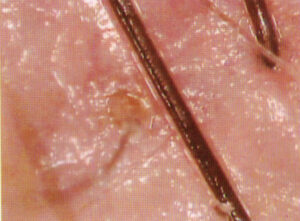
Like the skin on our face and body, our scalp can become sensitive too. It feels tight, dry, itchy and even painful, at times causing Dandruff to appear.
Signs of Sensitive Scalp
- Dryness: A sensitive scalp often feels dry and tight. You might notice flakiness or dandruff as the skin struggles to retain moisture.
- Burning Sensation: A burning or stinging sensation on the scalp can be a sign of sensitivity, especially after using certain hair products or undergoing hair treatments.
- Pain or Tenderness: A sensitive scalp can sometimes feel sore or tender to the touch. This pain may be localized or spread across the entire scalp.
- Dryness: A sensitive scalp often feels dry and tight. You might notice flakiness or dandruff as the skin struggles to retain moisture.
- Increased Oiliness: In some cases, a sensitive scalp might produce excess oil as it tries to compensate for dryness. This can lead to greasy hair and scalp, further complicating sensitivity issues.
Causes of Sensitive Scalp
- Climate and Pollution Changes: Sudden shifts in weather or exposure to pollution can generate free radicals in the environment. These free radicals alter the scalp’s structure, leading to inflammation and sensitivity. Over time, they can even affect the hair bulb, making the scalp more vulnerable.
- Stress: High levels of stress increase the production of free radicals in the body, which can exacerbate scalp sensitivity. Stress can also reduce the scalp’s ability to regenerate, making it more prone to irritation and discomfort.
- Unsuitable Hair Products: Harsh chemicals in hair products, such as shampoos, conditioners, or styling products, can strip away the scalp’s natural protective barrier. Ingredients like sulfates, parabens, and artificial fragrances may lead to itching, dryness, or flare-ups of sensitivity.
- Aggressive Hair Treatments: Hair styling techniques such as perming, rebonding, or excessive use of heat tools can damage the scalp, weakening its defenses and causing irritation. Frequent chemical treatments can also disrupt the scalp’s natural moisture balance, resulting in dryness or inflammation.
Addressing sensitive scalp concerns requires a gentle approach, using nourishing products and treatments designed to restore balance and comfort to the scalp.
Dandruff
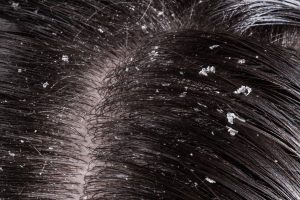
Skin cells are formed continuously on the scalp, which leads to the shedding of dead skin cells. This natural process happens every 20 to 28 days. Dandruff occurs when dead skin cells shed at a faster rate every 7 to 10 days. Oil from the scalp causes the dead skin cells to clump together, and they appear as white flakes. Scalp redness and irritation are commonly associated with dandruff too.
Signs of Dandruff
- White Flakes: The most recognizable sign of dandruff is the appearance of white or yellowish flakes on the scalp, hair, or even on clothing. These flakes are clumps of dead skin cells that have shed from the scalp at an accelerated rate.
- Itchy Scalp: Dandruff often causes an itchy sensation on the scalp, which can lead to frequent scratching.
- Scalp Redness and Irritation: Inflammation and redness may appear, especially in more severe cases of dandruff, contributing to discomfort and sensitivity.
- Oily or Greasy Scalp: Dandruff is often associated with an oily scalp, as excess oil can cause dead skin cells to clump together and form visible flakes.
- Dry Scalp: In contrast to oiliness, some people may experience dryness, where the scalp feels tight and flaky without excess oil.
- Hair Thinning: In some cases, dandruff can contribute to hair thinning, as the irritation and inflammation of the scalp can affect hair follicles.
Causes of Dandruff
- Environmental Stress: Exposure to pollution and changing weather conditions, especially in humid climates, can aggravate the scalp and trigger dandruff.
- Sensitive Scalp: Individuals with sensitive skin are more prone to irritation and dandruff.
- Incorrect Hair Care Products: Using unsuitable shampoos, conditioners, or hair treatments can disrupt the scalp’s natural balance, leading to flakiness.
- Skin Conditions or Diseases: Eczema, psoriasis, or fungal infections such as Malassezia can also result in excessive flaking and scalp irritation.
The good news is that dandruff is treatable. With proper scalp care and the use of the right products, dandruff can be effectively managed to restore a healthy, flake-free scalp.
Ageing Scalp

As we age, our scalps age along with us, but many don’t realise that the scalp is the fastest-ageing skin on the body. In fact, it ages 12 times faster than body skin and 6 times faster than facial skin. Over time, this leads to visible changes, including scalp sagging, loss of elasticity, thinning hair, grey hair, and even balding.
One major factor is the slowing of hair growth. While a healthy scalp typically allows hair to grow at an average rate of 1.25 cm per month, an ageing scalp can slow this down by as much as 80%, resulting in a growth rate of just 0.25 cm per month.
Key contributors to these changes include:
- Reduction in Collagen Levels: Collagen is essential for skin elasticity and strength. As we age, our scalp produces less collagen, weakening the structure of both the skin and hair follicles.
- Decreased Nutrient Supply: Ageing reduces the number of nutrients reaching the scalp, leading to weaker hair and a thinner scalp.
- Poor Blood Circulation: Blood flow diminishes with age, resulting in less oxygen and essential nutrients being delivered to the scalp and hair follicles.
- Underlying Health Issues: Kidney or liver problems can further exacerbate scalp ageing, as these organs play vital roles in filtering out toxins and ensuring nutrient absorption.
To maintain a youthful, healthy scalp, it is essential to incorporate treatments that promote collagen production, improve circulation, and nourish both the scalp and hair from within.
Fix your hair the Trichology Way in
3 easy steps
-
1. In-depth Analysis
We’ll conduct Tricho-Scan and Tricho-Analysis for detailed diagnosis of your hair and scalp conditions.
-
2. Treatments with European Herbs
Your customised treatment consists of a broad range of natural plant extracts to treat hair fall, hair loss, and other scalp problems.
-
3. Expert Advice
You’ll get expert advice from our professional Trichologist/Hair & Scalp specialist to maintain a healthier scalp for full, thicker hair.
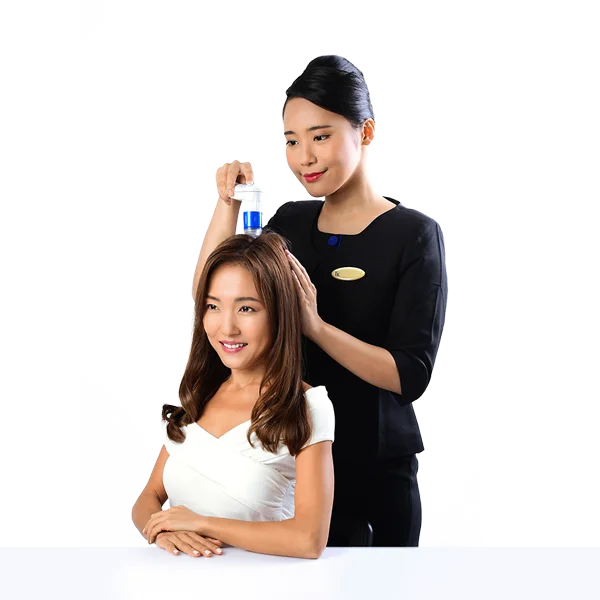
Regain your Confidence with Healthier Scalp & Hair

Cleanses and Detoxifies
Deeply cleanses and detoxifies clogged pores to optimise scalp health

Adds Shine and Lustre
Restores your hair’s natural shine and youthful lustre

Prevents Hair Loss and Hair Fall
Promote natural hair growth & improve hair thinning condition using technology validated by Trichologist.

Removes Oil Buildup
Balances scalp pH to regulate oil production and treat dry, itchy scalp

Nourishes Scalp and Hair
Provides micronutrients and vitamins for long-lasting results

Results After 1 Session
Absolutely rejuvenated, perfectly clean and well-nourished scalp with soft and frizz-free hair.
*Individual results may vary. There is no scientific proof that any product (except certain registered medicinal products) or service can retard hair loss or promote hair growth.
Frequently Asked Questions
Why is regular scalp care treatment important?
Scalp care is crucial because a healthy scalp provides the foundation for healthy hair growth. Neglecting scalp care can lead to issues like dryness, excess oil, dandruff, hair thinning, and even hair loss. Regular scalp maintenance helps ensure optimal hair health and can prevent common scalp conditions.
How often should I get a scalp treatment?
The frequency of scalp treatments depends on your scalp condition and needs. For general scalp maintenance, treatments every 4 to 6 weeks may be sufficient. However, if you have specific concerns like hair loss or a problematic scalp, more frequent treatments, such as weekly sessions, might be recommended by your specialist.
Can scalp treatments improve hair texture?
Yes, regular scalp treatments can improve hair texture. By ensuring a clean, nourished, and balanced scalp, hair can grow stronger, thicker, and smoother. Treatments that promote circulation and collagen production also help improve the overall structure and health of the hair.
Can scalp treatments help with dandruff and itchy scalp?
Yes, scalp treatments can effectively manage dandruff and soothe an itchy scalp. Specialised treatments target excess oil production, dryness, and flakiness by exfoliating dead skin cells and rebalancing the scalp’s moisture levels. With consistent care, these treatments can alleviate discomfort and reduce dandruff over time.
Award-Winning Hair Fall Prevention Treatment
FREE ScalpBoost Ampoule, Hair Bath (Shampoo)(50ml), CompleteKare Mask (Conditioner)(50ml)
@ $59.90 Nett
(U.P. $755)
Book An Appointment
We’d love to hear from you! Send us a message and We will get back to you as soon as possible!
*Individual results may vary. There is no scientific proof that any product (except certain registered medicinal products) or service can retard hair loss or promote hair growth.
“Personal data obtained from the above information may be used for the purpose of making you aware of our services or promotions which TK TrichoKare thinks you may be interested in. Such information may also be disclosed to carefully selected third parties for direct marketing. If you wish to withdraw your consent given here in, you can do so at any time by sending an email to us or call us.”
